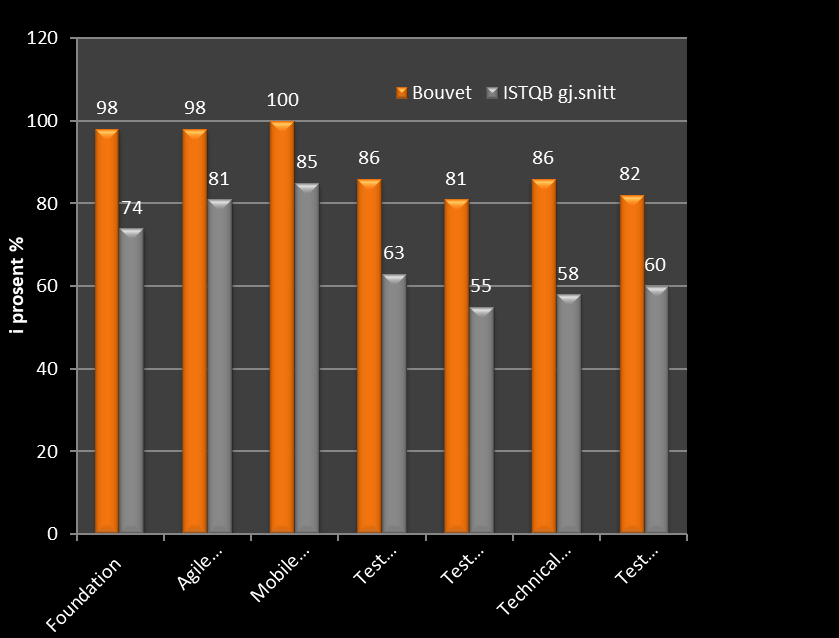Vanligvis vil CTRL + + tastene kunne brukes for å øke størrelsen, og CTRL + - for å redusere den.
Har du hjul på musen, kan du bruke CTRL sammen med hjulet for å justere størrelsen. På Mac kan du bruke CMD + + og CMD + -.
Dette kurset har ingen fremtidige kursdato(er) oppført. Bruk skjemaet for å kontakte kursholderen for mer informasjon.
Blended Virtual Course
The course is a hybrid of virtual training and self-study which will be a mixture of teaching using Microsoft Teams for short bursts at the beginning of the day, then setting work for the rest of the day and then coming back at the end of the day for another on-line session for any questions before setting homework in the form of practice exams for the evening. You do not have to install Microsoft Teams , you will receive a link and can access the course using the web browser.
Remote proctored exam
Take your exam from any location. Read about iSQI remote proctored exam here
Requirements for the exam:
This 3-day course is aimed at anyone wishing to attain the ISTQB Advanced Test Automation Engineer qualification. This qualification builds upon the Foundation syllabus and provides essential skills for all those involved in test automation and who want to develop further their expertise in one or more specific areas.
 Bouvet sine kursdeltakeres testresultater vs ISTQB gjennomsnitt
Bouvet sine kursdeltakeres testresultater vs ISTQB gjennomsnitt
A Test Automation Engineer is one who has broad knowledge of testing in general, and an in-depth understanding in the special area of test automation. An in-depth understanding is defined as having sufficient knowledge of test automation theory and practice to be able to influence the direction that an organization and/or project takes when designing, developing and maintaining test automation solutions for functional tests. The modules offered at the Advanced Level Specialist cover a wide range of testing topics.
Introduction and objectives for Test Automation
This section provides an introduction to test automation explaining the objectives, advantages, disadvantages and limitations of test automation as well as technical success factors of a test automation project.
Understanding the type of system is vital for determining the most appropriate automation solution and also how we can design systems and testing for more effective automation. This section also looks at how we can evaluate for the most appropriate tools.
The generic Test Automation architecture
A test automation engineer has the role of designing, developing, implementing, and maintaining test automation solutions. As each solution is developed, similar tasks need to be done, similar questions need to be answered, and similar issues need to be addressed and prioritized. These reoccurring concepts, steps, and approaches in automating testing become the basis of the generic test automation architecture, and this will be discussed in detail during this section
Deployment risks and contingencies
This section looks at the various risks associated with the deployment of test tools and how to avoid test automation failure.
Test Automation reporting and metrics
Providing information to stakeholders for them to make informed decisions about the quality of the software is a vital part of testing and this section looks at the various metrics that can be used to monitor test automation and what information should be supplied to the stakeholder and how it should be presented.
Transitioning manual testing to an automated environment
This section looks at the various criteria to apply to determine the suitability for automation and understanding the factors for transitioning from manual to automation testing
Verifying the Test Automation solution
To have justified confidence in the information we supply to the stakeholders regarding test automation we must have justified confidence in the test environment and test automation solution supporting the information
This section looks ahead and how we can improve the automation solution making it more effective and efficient
The ISTQB Advanced Test Automation Engineer exam is a 1 hour 30 minute, 40 question multiple-choice exam totaling 75 points. The pass mark is 65% (49 out of 75). It is a pre-requisite that attendees hold the ISTQB Foundation Level certificate.
Se flere kurs fra Bouvet Norge AS (103)
Påmeldingsskjema Kontakt oss




































































































